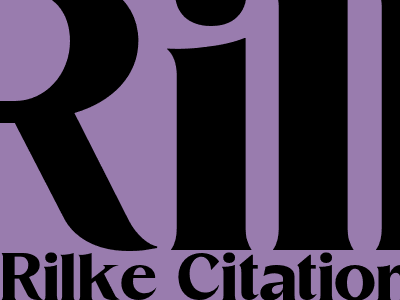Rilke Citations: A Comprehensive Guide to Quoting Rainer Maria Rilke
Introduction
Rainer Maria Rilke, the celebrated 20th-century German poet, has left an enduring legacy of profound and evocative verse. His works have inspired countless readers and writers alike, and his words continue to resonate deeply with audiences today. Whether you're a student, a scholar, or simply an admirer of Rilke's poetry, it's essential to know how to properly cite his works when referencing them in your own writing.
Why Cite Rilke?
Proper citation is not only a matter of academic integrity but also a way of acknowledging the intellectual contributions of others. By citing Rilke's works, you give credit where credit is due and demonstrate your respect for his authorship.
MLA Style
The Modern Language Association (MLA) style is commonly used in the humanities, including literary studies. When citing Rilke's poetry in MLA style, follow these guidelines:
- For a poem or sonnet, include the poem's title in quotation marks, followed by the title of the collection it appears in, italicized. Example: "The Panther" from New Poems.
- For a line or stanza from a poem, indicate the line or stanza number(s) after the poem's title. Example: "The Panther," lines 1-3.
- For a specific edition or translation of a poem, include the editor's or translator's name in parentheses. Example: "The Panther" from New Poems, translated by Stephen Mitchell.
Chicago Style
The Chicago Manual of Style is widely used in the social sciences and history. When citing Rilke's poetry in Chicago style, follow these guidelines:
- For a poem or sonnet, include the poem's title in quotation marks, followed by the title of the collection it appears in, italicized. Example: "The Panther" in New Poems.
- For a line or stanza from a poem, indicate the line or stanza number(s) after the poem's title. Example: "The Panther," lines 1-3.
- For a specific edition or translation of a poem, include the editor's or translator's name in parentheses. Example: "The Panther" in New Poems, trans. Stephen Mitchell.
APA Style
The American Psychological Association (APA) style is commonly used in psychology and other social sciences. When citing Rilke's poetry in APA style, follow these guidelines:
- For a poem or sonnet, include the poem's title in italics, followed by the title of the collection it appears in, italicized. Example: The Panther from New Poems.
- For a line or stanza from a poem, indicate the line or stanza number(s) after the poem's title. Example: The Panther, lines 1-3.
- For a specific edition or translation of a poem, include the editor's or translator's name and the publication date in parentheses. Example: The Panther from New Poems, trans. Stephen Mitchell (1989).
Conclusion
Citing Rilke's works correctly not only demonstrates your intellectual integrity but also enhances the credibility of your own writing. By following the guidelines outlined above, you can ensure that your citations are accurate, consistent, and compliant with academic standards.

Comments